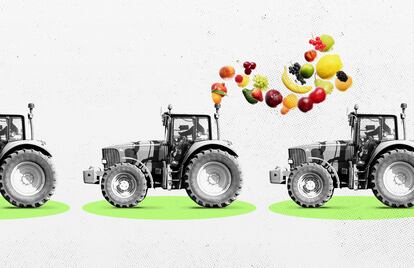The tractor revolution: contradictions and twists
The farmers’ revolt taking place in Europe is very much related to gastronomy. The industry’s demands underscore the need for not one, but many in-depth conversations about the food we put in our mouths every day

Four days ago there were tractors parked on Barcelona’s Diagonal Avenue blocking traffic while protesters roasted butifarra sausages and artichokes to the rhythm of ska music in the middle of the street, to the astonishment of expats and tourists alike who watched the scene unfold from a safe distance, as they licked their chops at the prospect of so much top-notch material to feed their Instagram stories, uploaded from the safety of their Airbnb rental balconies, which are no man’s land, no offense meant to Ikea.
You cannot be given a column to write about gastronomy and not talk about the elephant in the room. Because the tractor revolt is about gastronomy as much as the breakfast, lunch and dinner I had today, as much as all the meals I’ve ever had and all those that are yet to come with any luck. Me and everyone else who needs to eat to stay alive.
But it is impossible to put words together to make a sentence about this issue and not fall into an abyss of questions, dilemmas and contradictions. The agricultural sector protests taking place in Europe have included everyone from the owner of a macro-farm that fattens thousands of pigs to the owner of a monoculture plantation of nectarines and flat peaches, a farmer who tills four hectares of land using horses as the prime driving force, another one who practices regenerative agriculture and opposes the very action of farming, and a shepherd who takes care of a herd of 40 goats and ekes out a living selling cheese. The large landowners of Spain did not show up on the streets. These folks are more about solving their issues with a phone call from their office.
Also, I don’t know whether fishermen feel like farmers and whether they were there, either in body or spirit, nor do I know anything about the presence or position on the issue of the large numbers of seasonal workers and immigrants who work in the Spanish countryside.
Even so, the magnificent sight of the tractors entering in synchronized formation through the great arteries of the Catalan metropolis gave me goosebumps. The delegation was received with unanimous applause by the citizens, regardless of their color or political stripe or food preferences. If both omnivores and vegans, both large landowners and small farmers, can agree on something, it is that the food system as it is organized right now, despite taking different forms in each region and each individual plot of land, is a failed system.
Some protesters, desperate to wake up day after day to find their crops destroyed by wild animals, are asking for armed action against the plagues of rabbits, wild boar and roe deer. Others advocate for the abolition of livestock farming in its entirety and for rewilding, and the elimination of meat consumption in the world, without taking into account that right now only 10.8% of the planet’s land is arable, and that for now there is only one machine capable of transforming certain types of vegetation into protein that can be assimilated by the human organism — the herd —therefore turning their backs on the rest of the world that lives beyond the privileged West and which needs grazing to nourish itself. Meanwhile, every day we see news about terrible accidents or attacks on livestock as a result of the collision between those who experience the natural environment as a place to work and those who go visit it in a festive spirit.
There are those who defend another type of savagery, one of a neoliberal nature, a hyper-technicalization of agricultural production that is only within the reach of large investment funds, and a limitation of global food production, in a context of rampant biodiversity loss, to the three or four most productive and efficient varieties of each species, duly modified and genetically improved, in the hands of the 10 or 12 corporations in power, which own both the seeds and the patents on pesticides and drugs.
Many applauded when the president of the European Commission, Ursula von der Leyen, in view of the protests, announced the withdrawal of a legislative project aimed at halving the use of pesticides in agriculture, so that the EU’s agricultural production does not have to compete in the market with non-EU products that are not subject to such strict regulations. I wonder if the next step will be to continue “equalizing from below” and eliminate collective bargaining agreements, unions and labor rights in order to continue on the path of business competition on equal terms.
Given the protectionist position calling for the regulation of the EU market with tariffs and import duties, we will have to see how the countries to which we export will respond to these trade barriers — one of our star exports to Africa and America, by the way, are the same pesticides that are prohibited here.
The agricultural sector is calling for a reduction in bureaucracy, for setting fire to the exaggerated paperwork imposed by an inefficient administration and its obsession with guarantees, and it unanimously agrees on the need to promote locally sourced consumption among citizens. There are those who, within this idea of locally sourced food, include the art of creating tropical groves in the middle of dry land, further desertifying their environment by siphoning water from the aquifers to plant avocados and mangoes, and by establishing irrigation systems where almond and carob trees had previously grown, in order to continue exporting sweet fruit to the north of Europe. Locally sourced for us, not for the others.
The way I see it, locally sourced also means the pigs on the macro-farms that rule the region in which I live. I have more pig neighbors than human ones. If we say yes to that, then we have to think about what to do with the brutal pollution derived from this intensive farming that is devastating the land. And if we say no to the intensive practices of the porcine sector, then we must ask ourselves what will happen to 35.9% of Catalonia’s agricultural production (that is what this sector represents), its impact on GDP and all the jobs it generates, which in Spain are close to 415,000.
Each and every one of the strands used to weave the immense web of factors and events that participate in the agrarian world includes, within it, another infinity of threads made of different perspectives, debates, opposing positions, collateral damage and, above all, pending conversations that affect and connect with each of the foods we put in our mouths, all of us, every day, in the entire world.
We need not one, but as many great debates as necessary, with an eye on the long term and not on the next election, to make far-reaching decisions of depth. This is not a time for patches or short-term decisions or whitewashing, but rather a time to confront each and every one of the elephants in the room, inviting input from reputed voices and authorities, considering everyone affected, in pursuit of a hopeful future for all.
Sign up for our weekly newsletter to get more English-language news coverage from EL PAÍS USA Edition
Tu suscripción se está usando en otro dispositivo
¿Quieres añadir otro usuario a tu suscripción?
Si continúas leyendo en este dispositivo, no se podrá leer en el otro.
FlechaTu suscripción se está usando en otro dispositivo y solo puedes acceder a EL PAÍS desde un dispositivo a la vez.
Si quieres compartir tu cuenta, cambia tu suscripción a la modalidad Premium, así podrás añadir otro usuario. Cada uno accederá con su propia cuenta de email, lo que os permitirá personalizar vuestra experiencia en EL PAÍS.
¿Tienes una suscripción de empresa? Accede aquí para contratar más cuentas.
En el caso de no saber quién está usando tu cuenta, te recomendamos cambiar tu contraseña aquí.
Si decides continuar compartiendo tu cuenta, este mensaje se mostrará en tu dispositivo y en el de la otra persona que está usando tu cuenta de forma indefinida, afectando a tu experiencia de lectura. Puedes consultar aquí los términos y condiciones de la suscripción digital.









































